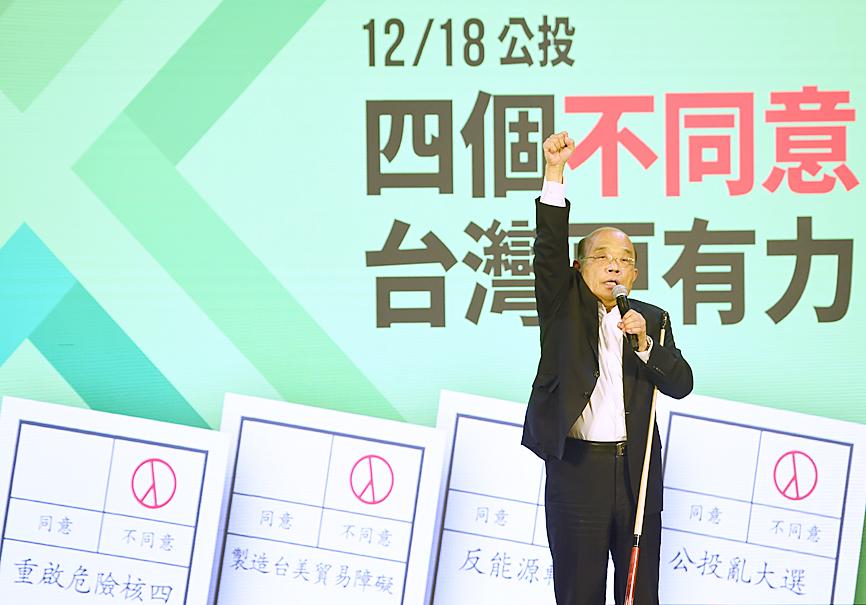All politically appointed central government officials and agencies of the Executive Yuan should be in lock-step with the government’s stance on all referendum issues, Premier Su Tseng-chang (蘇貞昌) said yesterday.
All agencies should work with the government to promote the government’s stance, Executive Yuan spokesman Lo Ping-cheng (羅秉成) quoted Su as telling yesterday’s weekly Cabinet meeting.
The Executive Yuan, at the top of the administrative branch, is obligated to tell the public that the government is opposed to the referendum questions and why, Su said.

Photo: Liu Hsin-de, Taipei Times
However, independent agencies, law enforcement, educational institutions, the military and retirement agencies are not mandated to promote the government’s stance, he said.
Su was describing how agencies under the Executive Yuan should divide their labor, not accusing them of not promoting the government’s stance on the referendums, Lo said.
“The premier has made known his stance, and asked that all Cabinet members know their roles,” Lo added.
Four questions are to be on the ballot in the Dec. 18 referendums: activating the Fourth Nuclear Power Plant, relocating a natural gas terminal project to protect algal reefs off Taoyuan’s Guanyin District (觀音), banning the importation of pork with traces of ractopamine, and holding referendums alongside elections.
The Democratic Progressive Party has urged the public to vote “no” on all four referendum questions.

Beijing could eventually see a full amphibious invasion of Taiwan as the only "prudent" way to bring about unification, the US Department of Defense said in a newly released annual report to Congress. The Pentagon's "Annual Report to Congress: Military and Security Developments Involving the People's Republic of China 2025," was in many ways similar to last year’s report but reorganized the analysis of the options China has to take over Taiwan. Generally, according to the report, Chinese leaders view the People's Liberation Army's (PLA) capabilities for a Taiwan campaign as improving, but they remain uncertain about its readiness to successfully seize

Taiwan is getting a day off on Christmas for the first time in 25 years. The change comes after opposition parties passed a law earlier this year to add or restore five public holidays, including Constitution Day, which falls on today, Dec. 25. The day marks the 1947 adoption of the constitution of the Republic of China, as the government in Taipei is formally known. Back then the Chinese Nationalist Party (KMT) governed China from Nanjing. When the KMT, now an opposition party in Taiwan, passed the legislation on holidays, it said that they would help “commemorate the history of national development.” That

Taiwan has overtaken South Korea this year in per capita income for the first time in 23 years, IMF data showed. Per capita income is a nation’s GDP divided by the total population, used to compare average wealth levels across countries. Taiwan also beat Japan this year on per capita income, after surpassing it for the first time last year, US magazine Newsweek reported yesterday. Across Asia, Taiwan ranked fourth for per capita income at US$37,827 this year due to sustained economic growth, the report said. In the top three spots were Singapore, Macau and Hong Kong, it said. South

Snow fell on Yushan (Jade Mountain, 玉山) yesterday morning as a continental cold air mass sent temperatures below freezing on Taiwan’s tallest peak, the Central Weather Administration (CWA) said. Snowflakes were seen on Yushan’s north peak from 6:28am to 6:38am, but they did not fully cover the ground and no accumulation was recorded, the CWA said. As of 7:42am, the lowest temperature recorded across Taiwan was minus-5.5°C at Yushan’s Fengkou observatory and minus-4.7°C at the Yushan observatory, CWA data showed. On Hehuanshan (合歡山) in Nantou County, a low of 1.3°C was recorded at 6:39pm, when ice pellets fell at Songsyue Lodge (松雪樓), a